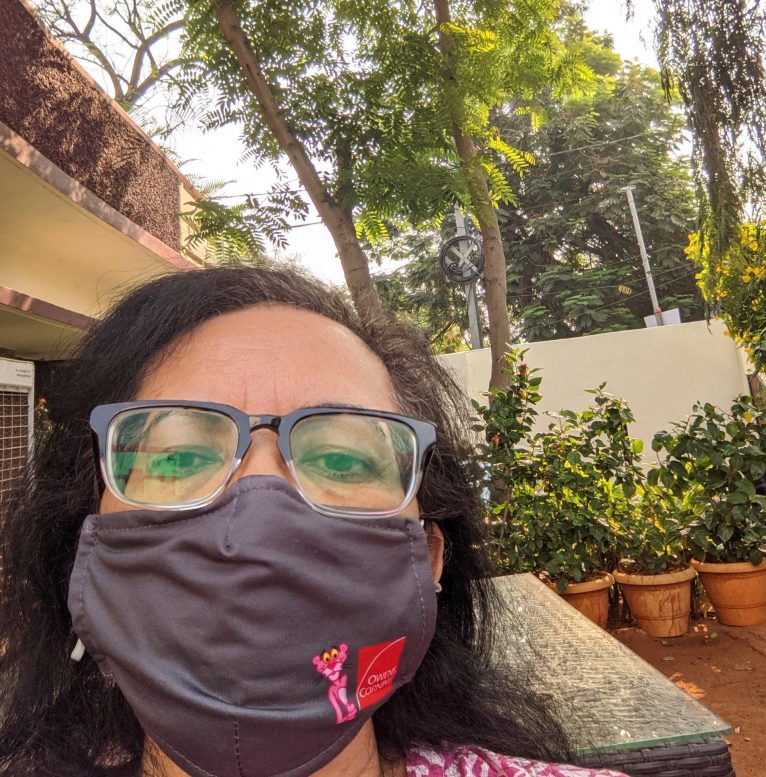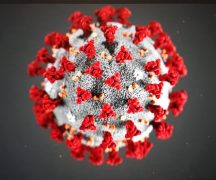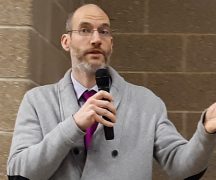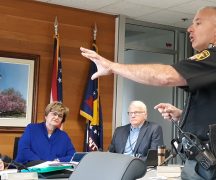By DAVID DUPONT
BG Independent News
When Malavika Melkote headed to India early this year, the attitude there was that despite a few cases, the country had beat the coronavirus.
Among those few cases, though, were her parents. Both her father and mother were hospitalized. He in the ICU. The doctors had little hope he would survive.
“As soon as he was in the hospital I knew I had to be prepared to go, so I looked high and low for a vaccine,” she said recently after her return to Bowling Green.
“That’s the most regretful part. That your last days are completely alone,” she said. One of her two brothers was able to get in to see their father, but they’re not sure given her father’s condition and the PPE visitors had to wear whether he even recognized his son.
Malavika and her family watched his funeral from Bowling Green. “It was all very surreal.”
They were fortunate to be able to get his body for cremation, she said, and to hold a simple funeral.
Her mother recovered, but Melkote knew she was needed in Hyderabad, her hometown, in central India. “My mother needed support. She was in a bad way.”
So Melkote sought out a vaccine as they were just starting to be rolled out. She ended up getting the vaccine in Lima.
Her mother insisted she get both doses and wait the required time before traveling. “I can’t afford another person getting COVID,” she told her daughter.
At the time, only the most vulnerable in India were getting the disease. Melkote said.
After strict controls earlier in the pandemic, the curve there had flattened to its lowest point.
At the end of February, she flew to JFK International. It was strange leaving Bowling Green “which feels very safe at all times.”
The flight there and the arrival at JFK involved a lot of safety protocols. That changed when she got to the international terminal. Every seat on the plane was filled. “It was chaos.”
People had face shields, until that is meals were served, and then the masks were off and people were chatting.
When she arrived in Hyderabad, the protocol was very efficient. She took a test and officials got back to her with results within a day.
“When I landed my biggest shock was how normal everything was,” she said. “’We Indians have beaten this. We have immunity.’ That’s the kind of thing you would hear,” she said
Even the government was proclaiming: “’We beat the pandemic. We’re on the other side.’”
Melkote always wore her mask, but many others were not. Things were opening up.
The family had a memorial service for her father. Those in the large crowd attending did wear masks.
Shortly after though people started hearing about cases in Mumbai, 15 at first, but doubling and tripling. She had cousins who returned to the city and contracted COVID-19. They are in their 30s and their cases were not severe.
“It just started to snowball,” Melkote said.
“India’s public health structure is not set up to handle a pandemic of this magnitude,” Melkote said. “Everything started collapsing. You didn’t have enough beds. … You didn’t have enough oxygen.”
The corporate hospitals that had emerged were even less ready to handle the crisis. “They were just crumbling.”
The government facilities had the best equipment and their staff had the best training. And they offer treatment for free if the patient is poor.
She heard the ambulances rushing back and forth. The news was filled with “the worst scenes of people not getting care.”
The national government’s response was ineffectual.
The most egregious thing that happened was the central government allowed elections to go on, she said. “We had thousands of people lined up to go vote in the middle of this pandemic in three states.”
Religious festivals also proceeded unimpeded.
Yet the people of India find ways to get through such crises, she said. Young people mobilized on social media to find care for strangers, for example.
The vaccine was late in coming, an irony because India is considered the vaccine capital of the world. But the government was not providing the two companies working on vaccines with the resources to produce, store and distribute the vaccines.
“They can’t do it on their own,” Melkote said.
With the government not buying, the companies exported the vaccines.
In April only 2 percent of the 1.4 billon Indians were vaccinated.
This is not, she noted, because of vaccine hesitancy.
Since the 1990s when the country launched a successful effort to eliminate polio, “taking the shot,” has become part of the culture.
Melkote remembers her mother, who was a pediatrician, having polio vaccine drives at her clinic.
“People in India are taught to believe in science.”
The government has now taken action and has eased patent restrictions so more companies can produce vaccines. Deals to sell vaccine abroad have been suspended. Now India hopes to have everyone vaccinated by December.
Melkote said her mother improved, her feelings of depression starting to lift a month after her husband’s passing. They filled their days sharing their love of cinema. Ordinarily when Melkote would be there she’d have friends and family to visit. Instead she spent her days inside her mother’s home.
Her stay lasted several weeks longer than anticipated, as she tried to book a flight from Hyderabad without going through Mumbai. She flew to Qatar then to Washington D.C.
When she arrived there was little fuss about the results of the test she took before embarking from India. She stayed with her son in Washington D.C. for a few days before returning to Bowling Green.
“I did not come home until I was tested,” she said.
Melkote, director IT & Analytics Center of Excellence at Owens Corning, had continued to work from India. At 5:30 she’d log on to interact with her colleagues in Toledo. She may as well have been in her basement in Bowling Green.
“It was really wonderful that my company gave me that flexibility and opportunity to take care of my family and continue to work,” she said. “It was fantastic. The work kept me so sane. … It was very cathartic to work from there.”





